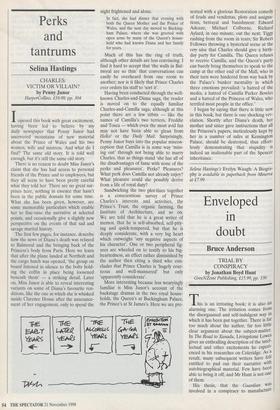Perks and tantrums
Selina Hastings
CHARLES: VICTIM OR VILLAIN? by Penny Junor HarperCollins, £16.99, pp. 304 Iopened this book with great excitement, having been led to believe by my daily newspaper that Penny Junor had uncovered mountains of new material about the Prince of Wales and his two women, wife and mistress. And what do I find? The same old story. It is told well enough, but it's still the same old story.
There is no reason to doubt Miss Junor's claim that she has had access to personal friends of the Prince and to employees, but they all seem to have been pretty careful what they told her. There are no great sur- prises here, nothing in essence that hasn't been in the public domain for some time. What she has been given, however, are some memorable particulars which enable her to fine-tune the narrative at selected points, and occasionally give a slightly new perspective on the events of that sad and savage marital history.
The first few pages, for instance, describe how the news of Diana's death was relayed to Balmoral and the bringing back of the Princess's body from Paris. Here we learn that after the plane landed at Northolt and the cargo hatch was opened, 'the group on board listened in silence to the bolts hold- ing the coffin in place being loosened beneath them' — a striking detail. Later on, Miss Junor is able to reveal interesting variants on some of Diana's favourite ren- ditions, like the one in which she is whisked inside Clarence House after the announce- ment of her engagement, only to spend the night frightened and alone.
In fact, she had dinner that evening with both the Queen Mother and the Prince of Wales, and the next day moved to Bucking- ham Palace, where she was greeted with open arms by many of the Queen's house- hold who had known Diana and her family for years.
Much of this has the ring of truth, although other details are less convincing. I find it hard to accept that 'the walls in Bal- moral are so thin' that conversations can easily be overheard from one room to another; nor is it likely that Prince Charles ever orders his staff to 'sort it'.
Having been conducted through the well- known Charles-and-Diana saga, the reader is moved on to the equally familiar Charles-and-Camilla saga, although at this point there are a few titbits — like the names of Camilla's two terriers, Freddie and Tosca — which even the most avid fan may not have been able to glean from Hello! or the Daily Mail. Surprisingly, Penny Junor buys into the popular miscon- ception that Camilla is in some way 'miss- ing out' through not being able to marry Charles, that as things stand 'she has all of the disadvantages of fame with none of the perks and pleasures'. Perks? Pleasures? What perk does Camilla not already enjoy? What pleasure could she possibly derive from a life of royal duty?
Sandwiching the two plot-lines together is a conscientious survey of Prince Charles's interests and activities, the Prince's Trust, the organic farming, the Institute of Architecture, and so on. We are told that he is a great writer of memos, that he is self-absorbed, self-pity- ing and quick-tempered, but that he is deeply considerate, with a very big heart which outweighs 'any negative aspects of his character'. One or two peripheral fig- ures are wheeled on to testify to his big- heartedness, an effect rather diminished by the author then citing a third who con- cludes that Prince Charles is 'hugely cour- teous and well-mannered' but only `apparently considerate'.
More interesting because less wearyingly familiar is Miss Junor's account of the backstage dramas in the two royal house- holds, the Queen's at Buckingham Palace, the Prince's at St James's. Here we are pre- sented with a glorious Restoration comedy of feuds and vendettas, plots and assigna- tions, betrayal and banishment: Edward Adeane, Michael Colborne, Richard Aylard, in one minute, out the next; Tiggy rushing from the room in tears; Sir Robert Fellowes throwing a hysterical scene at the very idea that Charles should give A birth- day party for Camilla. The Queen refuses to receive Camilla, and the Queen's party can barely bring themselves to speak to the camp at the other end of the Mall, who in their turn were hindered from way back by the Palace's bunker mentality in which three emotions prevailed: 'a hatred of the media, a hatred of Camilla Parker Bowles and a hatred of the Princess of Wales, who terrifed most people in the office.'
I began by saying that there is little new in this book, but there is one shocking rev- elation. Shortly after Diana's death, her mother and sister gave instructions that all the Princess's papers, meticulously kept by her in a number of safes at Kensington Palace, should be destroyed, thus effort- lessly demonstrating that stupidity is indeed an inalienable part of the Spencer inheritance.
Selina Hastings's Evelyn Waugh: A Biogra- phy is available in paperback from Minerva at £7.99.


















































































 Previous page
Previous page